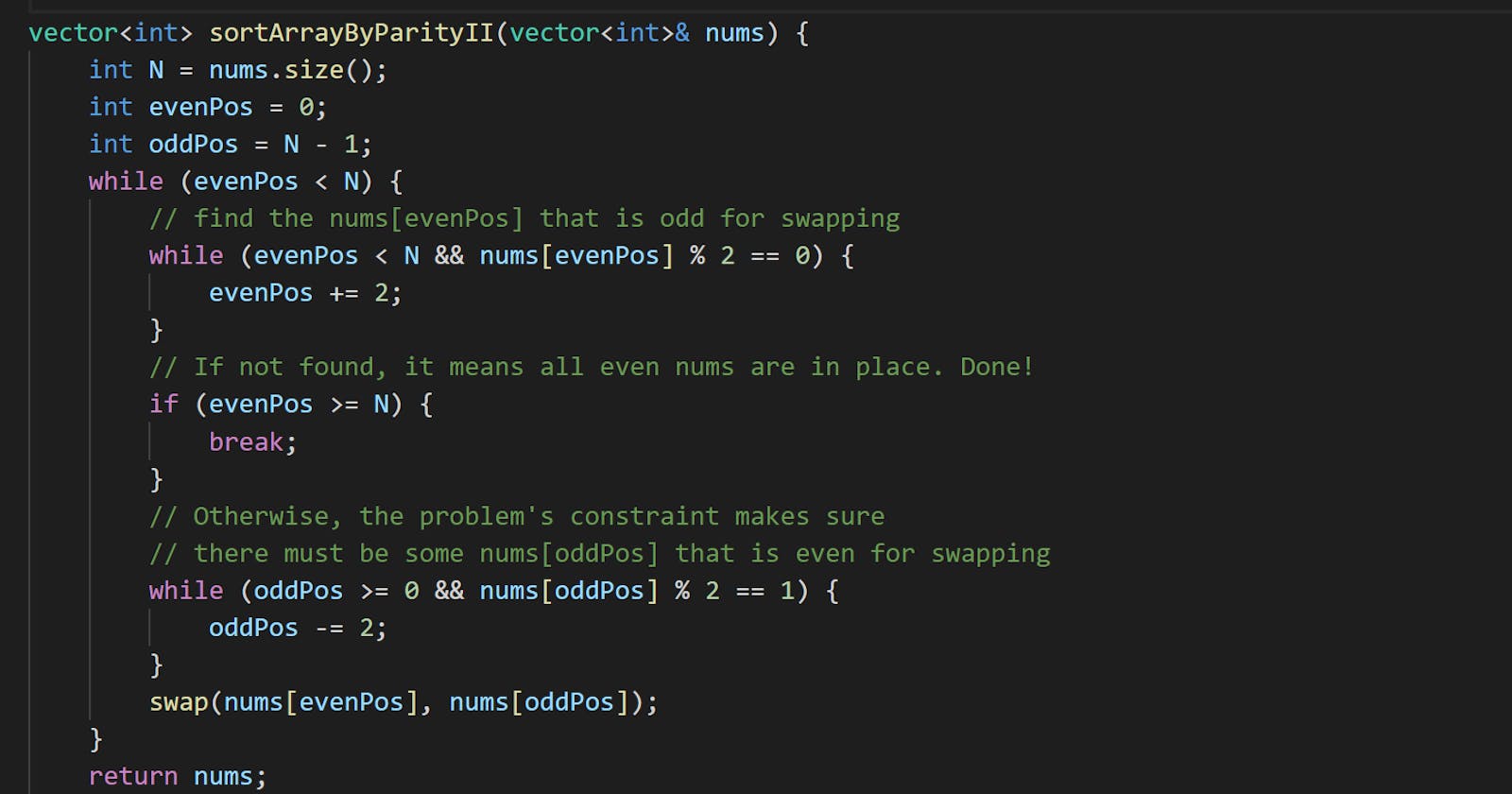Problem statement
Given an array of integers nums, half of the integers in nums are odd, and the other half are even.
Sort the array so that whenever nums[i] is odd, i is odd, and whenever nums[i] is even, i is even.
Return any answer array that satisfies this condition.
Example 1
Input: nums = [4,2,5,7]
Output: [4,5,2,7]
Explanation: [4,7,2,5], [2,5,4,7], [2,7,4,5] would also have been accepted.
Example 2
Input: nums = [2,3]
Output: [2,3]
Constraints:
2 <= nums.length <= 2 * 10^4.nums.lengthis even.Half of the integers in
numsare even.0 <= nums[i] <= 1000.
Solution 1: Bubble Sort
For each 0 <= i < nums.length, if nums[i] has the same parity with i, you do nothing. Otherwise, you need to find another nums[j] that has the same parity with i to swap with nums[i].
Example 1
For nums = [4,2,5,7]:
nums[0] = 4is even likei = 0.nums[1] = 2is even, unlikei = 1is odd. Foundnums[2] = 5is odd. Swapnums[1] <-> nums[2].nums[2]becomes2whilenums[1]becomes5is odd likei = 1.nums[2] = 2is even, likei = 2.nums[3] = 7is odd likei = 3.
Code
#include<vector>
#include<iostream>
using namespace std;
vector<int> sortArrayByParityII(vector<int>& nums) {
for (int i = 0; i < nums.size(); i++) {
if (i % 2 != nums[i] % 2) {
for (int j = i + 1; j < nums.size(); j++) {
if (nums[j] % 2 == i % 2) {
swap(nums[i], nums[j]);
break;
}
}
}
}
return nums;
}
void print(vector<int>& nums) {
for (auto num : nums) {
cout << num << " ";
}
cout << endl;
}
int main() {
vector<int> nums = {4,2,5,7};
auto result = sortArrayByParityII(nums);
print(result);
nums = {1,0,7,3,8,9,2,5,4,1,2,4};
result = sortArrayByParityII(nums);
print(result);
nums = {3,4};
result = sortArrayByParityII(nums);
print(result);
nums = {648,831,560,986,192,424,997,829,897,843};
result = sortArrayByParityII(nums);
print(result);
}
Output:
4 5 2 7
0 1 8 3 2 9 4 5 2 1 4 7
4 3
648 831 560 997 192 829 986 897 424 843
Complexity
Runtime:
O(N^2), whereN = nums.length.Extra space:
O(1).
Solution 2: Make use of the problem’s constraints
In the Bubble Sort approach, you do not make use of the constraint that half of the integers in nums are even. Because of that, these are unnecessary things:
The loops scan through full
nums.The loops are nested. That increases the complexity.
The
swap(nums[i], nums[j])happens even whennums[j]was already in place, i.e.nums[j]had the same parity withj(Why to move it?).
Here is the solution when taking the important constraint into account.
Code
#include<vector>
#include<iostream>
#include <algorithm>
#include<unordered_map>
using namespace std;
vector<int> sortArrayByParityII(vector<int>& nums) {
int N = nums.size();
int evenPos = 0;
int oddPos = N - 1;
while (evenPos < N) {
// find the nums[evenPos] that is odd for swapping
while (evenPos < N && nums[evenPos] % 2 == 0) {
evenPos += 2;
}
// If not found, it means all even nums are in place. Done!
if (evenPos >= N) {
break;
}
// Otherwise, the problem's constraint makes sure
// there must be some nums[oddPos] that is even for swapping
while (oddPos >= 0 && nums[oddPos] % 2 == 1) {
oddPos -= 2;
}
swap(nums[evenPos], nums[oddPos]);
}
return nums;
}
void print(vector<int>& nums) {
for (auto num : nums) {
cout << num << " ";
}
cout << endl;
}
int main() {
vector<int> nums = {4,2,5,7};
auto result = sortArrayByParityII(nums);
print(result);
nums = {1,0,7,3,8,9,2,5,4,1,2,4};
result = sortArrayByParityII(nums);
print(result);
nums = {3,4};
result = sortArrayByParityII(nums);
print(result);
nums = {648,831,560,986,192,424,997,829,897,843};
result = sortArrayByParityII(nums);
print(result);
}
Output:
4 5 2 7
0 1 8 3 2 9 4 5 2 1 4 7
4 3
648 831 560 997 192 829 986 897 424 843
Complexity
Runtime:
O(N), whereN = nums.length.Extra space:
O(1).
